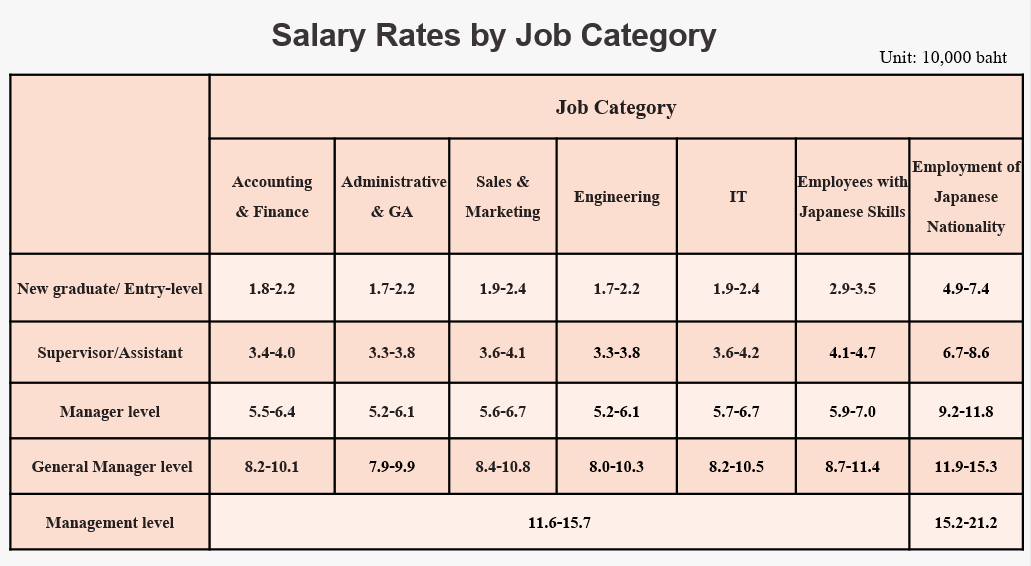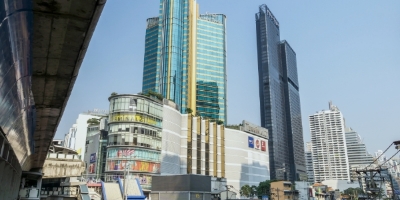Salary Survey of Japanese Companies by Job Category in 2024
In October 2024, Personnel Consultant Co., Ltd. conducted a Salary & Benefits Survey 2024 to collect data related to human resources aspects such as salaries and benefits in Japanese companies operating in Thailand. This survey received cooperation from 923 registered client companies and was conducted from September 17 to October 4, 2024. The objective was to provide useful insights into salary structures, benefits, and human resources trends in Japanese companies in Thailand.
Salary Levels for Employees in Japanese Companies in Thailand
This survey categorized data into seven job functions, including the employment of Japanese nationals in Thailand and individuals with Japanese language skills. The 2024 survey results indicated that the average salary levels of Thai employees working in Japanese companies in Thailand have not changed significantly compared to 2023. The salary range for Thai job seekers has remained stable over the past two years. However, minimum salary levels for Thai employees at the supervisor to manager levels have increased slightly.
** See details in the chart below

Key Findings from the Survey
- When recruiting employees, comparing the salary of the candidate’s previous position is important. However, it is also crucial to consider the overall market salary trends.
- Since this survey is primarily based on Japanese companies, it is necessary to compare the salary levels with local Thai companies and other foreign firms.
- Job-hopping is a common trend in Thailand’s job market, where many international companies (non-Japanese) expect short tenures from employees.
- In contrast, Japanese companies strongly prefer long-term employment. To achieve this, companies must improve the work environment and offer career growth
Salary Rates by Job Category
1. Accounting and Finance
For new graduates and entry-level employees, the salary rate is comparable to that of administrative positions, averaging between 18,000 – 22,000 THB. This rate has remained relatively unchanged over the past two years. Additionally, there is a high demand for accounting professionals with language skills and CPD certification, and they tend to receive salaries above the market average at all levels.
2. Administrative & General Affairs
The salary for new graduates and entry-level employees is similar to that of accounting and finance roles, with an average of 17,000 – 22,000 THB. For newly established companies, hiring experienced professionals can help reduce management workload. Therefore, selecting personnel for these positions requires careful and meticulous consideration.
3.Sales & Marketing
New graduates and entry-level employees earn an average salary of 19,000 – 24,000 THB. When including commission or incentives, total earnings can reach approximately 30,000 THB. This rate has remained stable over the past two years. Salaries for supervisor and assistant manager positions vary depending on sales performance. Recently, more companies have started offering higher commissions and incentives to boost employee motivation.
4.Engineering
For new graduates and entry-level employees, the average starting salary ranges from 17,000 – 22,000 THB, which has not significantly changed in the past two years.
Many companies seek engineers with language skills, but the supply of professionals proficient in English or Japanese remains limited. As a result, salaries for candidates with language skills tend to be higher. The demand for engineers fluent in Japanese is increasing every year, especially for those who graduated from universities in Japan. Even as fresh graduates, they can earn a starting salary of over 30,000 THB. In some cases, they are even recruited for high-responsibility roles in Japan.
5.IT (Information Technology)
Over the past few years, IT has been one of the most in-demand fields, both in Japanese and international companies. The starting salary for new graduates and entry-level employees is around 19,000 – 24,000 THB. As IT becomes essential across industries and digital transformation (DX) continues to grow, professionals with both English proficiency and programming skills are highly sought after. This has led to a noticeable increase in salaries for IT roles. In some cases, Japanese companies offer lower salary rates compared to Thai and other international companies.
6.Thai Executives and Board-Level Personnel
The proportion of Japanese executives in companies has been gradually declining, while many companies are restructuring and hiring more capable Thai executives.
In the future, Japanese companies in Thailand should consider career progression for Thai employees, including promotions to executive positions. This should be integrated into salary structure planning to foster organizational growth and motivate employees.
7.Employees with Japanese Language Skills
New graduates and entry-level employees with Japanese language proficiency generally receive salaries 30% higher than other fields.
- Those with JLPT N3 certification can expect a salary of 23,000 – 25,000 THB.
- Those with JLPT N2 certification can earn 25,000 – 30,000 THB.
- Those with JLPT N1 certification typically receive 30,000 – 35,000 THB.
Additional language allowances vary by company and industry:
- N3: Additional 2,000 – 4,000 THB on average
- N2: Additional 2,000 – 8,000 THB on average
- N1: Additional 10,000 THB or more, especially in the manufacturing industry.
Employment of Japanese Nationals
Currently, the minimum legal wage for Japanese nationals working in Thailand is set at 50,000 THB under Thai labor law. Obtaining a work visa and work permit is a fundamental requirement.
In particular, young professionals in their late 20s to early 30s tend to prefer stable employment and rarely change jobs. Many companies face difficulties in recruiting young Japanese talent abroad, as this demographic is both scarce and highly sought after. Consequently, the job market for young Japanese professionals is highly competitive, leading to increasing salary trends.
Salary Increments
According to the 2024 salary adjustment survey, most companies reported salary increases in the range of 3.1% to 4.0%
- 37% of manufacturing companies
- 28% of non-manufacturing companies
Conversely, some companies did not implement any salary increases:
- 3% of manufacturing companies
- 8% of non-manufacturing companies
These figures are similar to the previous year.
For companies that reported salary increases of 4.1% or higher:
- 18% were in the manufacturing sector (down from 22% last year)
- 28% were in the non-manufacturing sector (down from 30% last year)
Although there are no significant changes in salary adjustments for 2025, the 4.1% to 5.0% salary increment rate in the manufacturing sector has slightly declined. This indicates that many companies are cautiously monitoring economic growth for the coming year.
In general, Japanese companies in Bangkok and industrial estates report an average salary increase of 2.0% to 4.0%.
Full Report on Salary & Benefits for Japanese Companies in Thailand 2024
Clients who require comprehensive statistical data on salaries and benefits for Japanese companies in Thailand can download the full report:
- Japanese Version: Download Here
- Thai Version: Download here
For further inquiries, please contact us at: Tel. 02-260-58454 or jobs@personnelconsultant.co.th
If you are looking for talent & staffing, please contact us through this form Click










